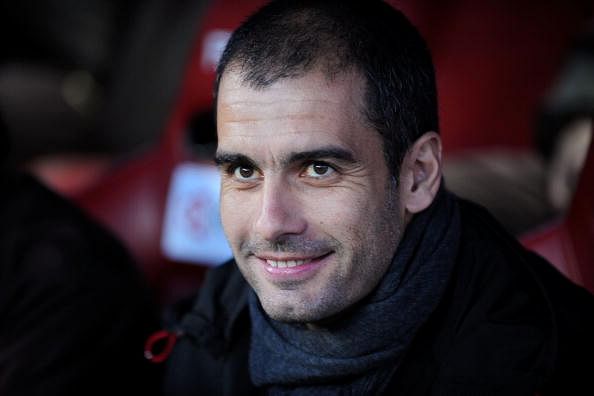
On a mildly cold spring night in
Manchester, Paul Scholes scored a rocket from 25 yards to put the final
nail in the coffin of Frank Rijkaard’s reign at the Nou Camp. What had
been suspected for quite some time, looked inevitable now. A 4-year-long
journey, which began in 2004, seemed destined to conclude very shortly.
And so it did. On the night of May 8, bitter rivals Real Madrid mauled
Barcelona at the Camp Nou. But the night had grown sour on more than
just one tone. President Laporta announced that Frank Rijkaard would be
stepping down as manager come the end of the season. What seemed
inevitable for quite some time, finally took place. It almost fell that
an era had come to an end. An era in which the world saw the best of
Ludovic Guily, Rafael Marquez, Deco and above all, the might of the
Samba Star – Ronaldinho.
The 2007-08 season was a disastrous
campaign for Barcelona on all fronts. On the field, the team lost out on
the League to rivals Real Madrid and were knocked out of the European
Cup by eventual winners, Manchester United. Off the football pitch,
“the team’s stars lived a high life - convinced like so many gifted,
rich young athletes before them that they were so talented, so full of
the magic dust which makes superstars that they could bend the rules and
still excel. They were wrong.” Rijkaard lost the dressing room and the club. Eventually, the fans too.
And this is where President Laporta had to intervene. Rijkaard was shown the door, and Guardiola
was called upon to replace the Dutch enforcer. Fans expected as much
from their captain in his managerial capacity as they had previously
seen in his days as a midfield general. Guardiola‘s
notable work with the youth team, resurrecting the academy from the
ashes, was duly rewarded by the hierarchy. Though the fans expected a
high profile man to take charge, Guardiola‘s
appointment was met with skepticism as he freed up the squad from the
shackles of soaring egos and lazy attitudes by selling the poster boy of
Barcelona – Ronaldinho,
and the midfield maestro – Deco. Little knowledge did the club’s fans
and its officials have of the dream that they were about to see. Little
did they know, about the magic that was to follow. Little did they know,
that their club was about to probably change the face of football.
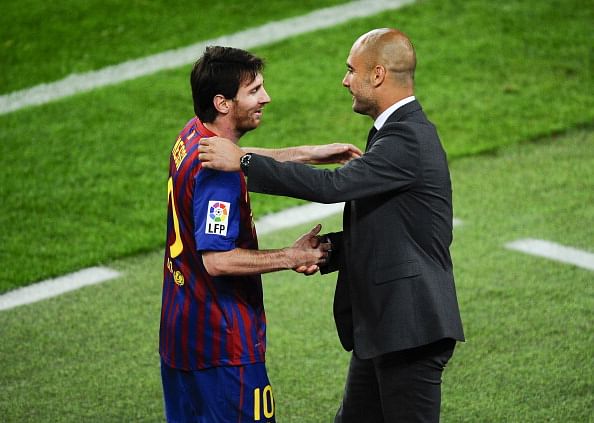
The first, and probably the biggest
decision by Guardiola as a Barcelona manager was selling Ronaldinho, and
diverting the spotlight of the footballing world to the new sensation
on the blocks, Lionel Messi. Under Rijkaard, Messi was always
overshadowed by the overseas talent in the shape of Ronaldinho and Deco.
But now was the time to take the next step. As Graham Hunter points out
- “If Messi found a taste for nightlife too, then Barca
might lose three great players instead of just two. The Brazilians had
to go”
Initially, the Argentine forward played
on the right of a forward three. A year later, he spearheaded the
attack. Another year later, he became the epitome of a new system at the
Nou Camp – by playing the ‘False 9.’ Three roles, three success stories
with each story being better than the one before. From being a ‘small
lad’ , Messi has gone onto become a colossus in world football. The
talent was always there. It needed the backing of the men who mattered,
and that is when Guardiola played the role of a father to Messi.
Overseas talent had always found
priority in Rijkaard’s scheme of things – Guily, Marquez, Ronaldinho and
Deco were elected to be the faces of Barcelona. The La Masia graduates,
except a few chosen ones, found it ridiculously tough to make the cut
at the senior level, a prime example of which is the Barcelona
full-back, Jordi Alba. The cantera was in utter dis-array, and the nadir
of playing in the 4th division marked the dark period of the famed ‘La
Masia.’ Xavi, who is widely regarded as the DNA of the current Barca
team, launched a stinging attack on his former mentor by claiming that
Rijkaard had never appreciated his talents.
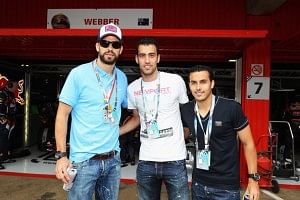
Busquets, Pique and Pedro -The 3 who made it big.
This apartheid was phased out when
Guardiola took charge. One of the primary reasons for the, so to say
‘bias’ towards La Masia graduates, was that Pep himself was in charge of
the youth team prior to his appointment as the first team manager. He
was ready to build his philosophy around La Masia. Marquez was replaced
by Pique (who was summoned back from his stint at Manchester United),
Yaya Toure was replaced by Busquets and Thierry Henry was replaced by
Pedro. This ‘bias’ meant that overseas and well-established talent found
it increasingly difficult to cement a place in the starting line-up,
and were compelled to look for game time elsewhere. And the faith shown
in the club’s Cantera has been duly repaid. Sergio Busquets is widely
regarded as one of the best anchors in the game currently. Pique has
elevated himself from being a ’squad player’ to being among the premier
center backs in the game, currently. And now, the next bunch of
youngsters – Tello, Cuenca, Sergi Roberto, Fontas and Martin Montoya –
seem poised to continue the legacy of their predecessors.
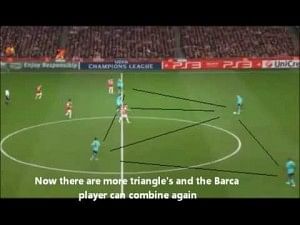
A sample of Barcelona’s passing game and creation of space.
First as a player, then as a manager –
Guardiola has Barca’s blood running through him since the days of his
childhood. Frank Rijkaard’s philosophy hinged around quick passing and
interchanging in the final third, with all other components being a
subset of a ludicrously attacking side that went on to conquer Europe in
2006. He favoured the ’4-1-2-1-2′ or the ‘Diamond’ formation, in which
the major attacking threat came from the left with Ronaldinho and Deco
feasting upon the opposition. In total contrast, Guardiola instilled the
‘passing game’ at the Nou Camp, with the motto being – ‘Pass the ball
until the opposition is forced into submission.’ In many encounters
under Guardiola, Barcelona simply outpassed the opposition to victory,
with all of it looking most simple at face value, but being the most
difficult to implement in the day-to-day scheme of things. The forte of
Guardiola’s system was – positional interchange and manufacturing space
in water tight situations.
It’s
hardly surprising that Spain’s golden era in World Football co-incided
with Barcelona’s domination of football under Guardiola. The axis of
Xavi and Iniesta has been gleefully adopted by Del Bosque for the
national team, with the move yielding ‘supernatural’ returns on both
club and national level. In the 2006 World Cup, Barcelona had just 3
players representing the Spain national team. In the 2010 World Cup,
Barcelona had 7 – a testament to the immense work put in by Pep.
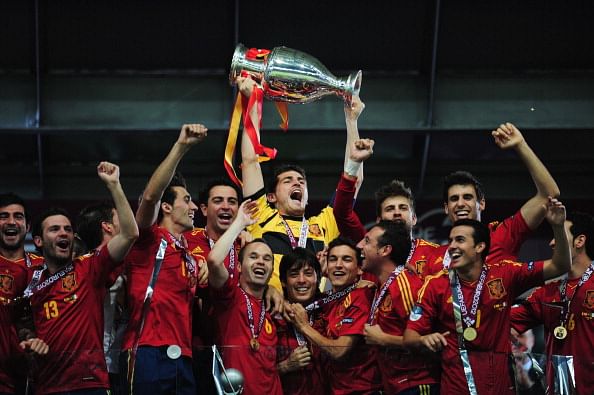
Barcelona’s contribution to Spain’s success cannot be underestimated
4 seasons – 14 trophies, achieved
through countless hours of elegant yet breath-taking football. The team
that Guardiola built could not work on a Plan B – as evident from the
failure of a ‘goal-scoring striker’ in Ibrahimovic. The calmness at work
and the capability to deal with adversity puts Guardiola in a different
league altogether - having seen veteran Eric Abidal and assistant
manager Tito Vilanova forced to battle life-threatening illnesses during
his tenure and yet going on to win the La Liga and the European Cup by
defeating a wily Scot’s Manchester United, surely is no mean feat.
But as it said, no one is a
perfectionist. Every great person has minor flaws, and the only visible
set-back in Guardiola is his scouting – bringing in the likes of
Aleksandr Hleb, Dmitri Chygrynskiy and the audacious attempt at
replacing one of the iconic strikers in Samuel Eto’o with Zlatan
Ibrahimovic, are moves which hopelessly backfired for the Catalans. And
just as a true professional acts quickly to mend his mistakes, Guardiola
did not hesitate to get rid of any non-performing assets. Even Zlatan
Ibrahimovic wasn’t spared.
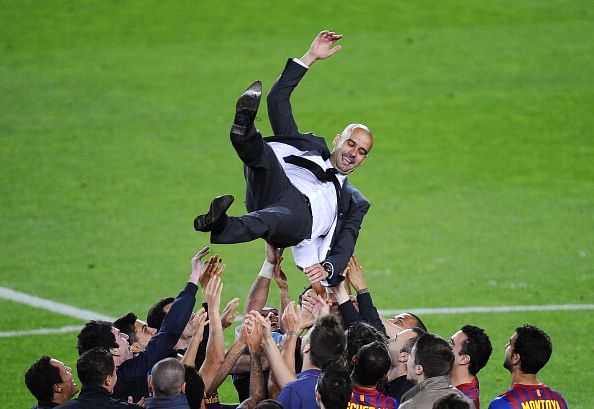
Gracias Pep! After
serving his beloved club for over a decade, Guardiola’s appointment to
stabilize a tricky period at the Nou Camp could be put down as ‘poetic
justice.’ Being the manager of Barcelona is not easy. You’re expected
to win most of your games – be it a friendly or a cup-final. After
winning every possible trophy there is to be won, breaking all records
time and time again and setting a whole new bench-mark – Pep surely did
justice to Laporta’s decision of appointing him to calm the storm at
sea. And after those 4 exhausting, enthralling, enticing, breath-taking,
record-breaking and once in a lifetime seasons, Guardiola deserved his
break. We fall short of adjectives in trying to describe the team that
he built and the only hope remains that this team continues
to exhilarate and the creator of it returns to football, so that the
game takes another step forward.





